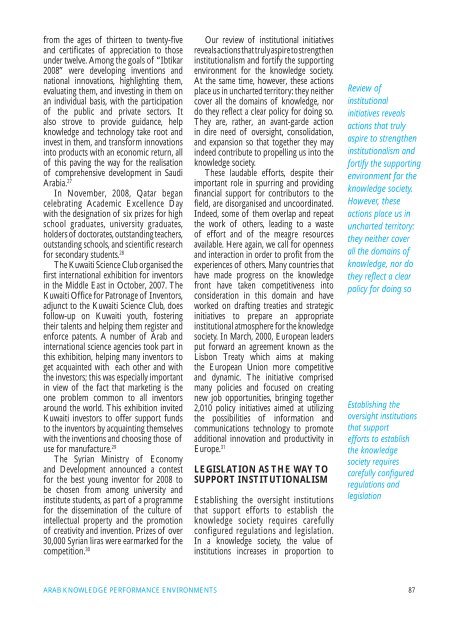Arab Knowledge Report 2009: Towards Productive
Arab Knowledge Report 2009: Towards Productive
Arab Knowledge Report 2009: Towards Productive
- No tags were found...
Create successful ePaper yourself
Turn your PDF publications into a flip-book with our unique Google optimized e-Paper software.
from the ages of thirteen to twenty-fiveand certificates of appreciation to thoseunder twelve. Among the goals of “Ibtikar2008” were developing inventions andnational innovations, highlighting them,evaluating them, and investing in them onan individual basis, with the participationof the public and private sectors. Italso strove to provide guidance, helpknowledge and technology take root andinvest in them, and transform innovationsinto products with an economic return, allof this paving the way for the realisationof comprehensive development in Saudi<strong>Arab</strong>ia. 27In November, 2008, Qatar begancelebrating Academic Excellence Daywith the designation of six prizes for highschool graduates, university graduates,holders of doctorates, outstanding teachers,outstanding schools, and scientific researchfor secondary students. 28The Kuwaiti Science Club organised thefirst international exhibition for inventorsin the Middle East in October, 2007. TheKuwaiti Office for Patronage of Inventors,adjunct to the Kuwaiti Science Club, doesfollow-up on Kuwaiti youth, fosteringtheir talents and helping them register andenforce patents. A number of <strong>Arab</strong> andinternational science agencies took part inthis exhibition, helping many inventors toget acquainted with each other and withthe investors; this was especially importantin view of the fact that marketing is theone problem common to all inventorsaround the world. This exhibition invitedKuwaiti investors to offer support fundsto the inventors by acquainting themselveswith the inventions and choosing those ofuse for manufacture. 29The Syrian Ministry of Economyand Development announced a contestfor the best young inventor for 2008 tobe chosen from among university andinstitute students, as part of a programmefor the dissemination of the culture ofintellectual property and the promotionof creativity and invention. Prizes of over30,000 Syrian liras were earmarked for thecompetition. 30Our review of institutional initiativesreveals actions that truly aspire to strengtheninstitutionalism and fortify the supportingenvironment for the knowledge society.At the same time, however, these actionsplace us in uncharted territory: they neithercover all the domains of knowledge, nordo they reflect a clear policy for doing so.They are, rather, an avant-garde actionin dire need of oversight, consolidation,and expansion so that together they mayindeed contribute to propelling us into theknowledge society.These laudable efforts, despite theirimportant role in spurring and providingfinancial support for contributors to thefield, are disorganised and uncoordinated.Indeed, some of them overlap and repeatthe work of others, leading to a wasteof effort and of the meagre resourcesavailable. Here again, we call for opennessand interaction in order to profit from theexperiences of others. Many countries thathave made progress on the knowledgefront have taken competitiveness intoconsideration in this domain and haveworked on drafting treaties and strategicinitiatives to prepare an appropriateinstitutional atmosphere for the knowledgesociety. In March, 2000, European leadersput forward an agreement known as theLisbon Treaty which aims at makingthe European Union more competitiveand dynamic. The initiative comprisedmany policies and focused on creatingnew job opportunities, bringing together2,010 policy initiatives aimed at utilizingthe possibilities of information andcommunications technology to promoteadditional innovation and productivity inEurope. 31LEGISLATION AS THE WAY TOSUPPORT INSTITUTIONALISMEstablishing the oversight institutionsthat support efforts to establish theknowledge society requires carefullyconfigured regulations and legislation.In a knowledge society, the value ofinstitutions increases in proportion toReview ofinstitutionalinitiatives revealsactions that trulyaspire to strengtheninstitutionalism andfortify the supportingenvironment for theknowledge society.However, theseactions place us inuncharted territory:they neither coverall the domains ofknowledge, nor dothey reflect a clearpolicy for doing soEstablishing theoversight institutionsthat supportefforts to establishthe knowledgesociety requirescarefully configuredregulations andlegislationARAB KNOWLEDGE PERFORMANCE ENVIRONMENTS87
















